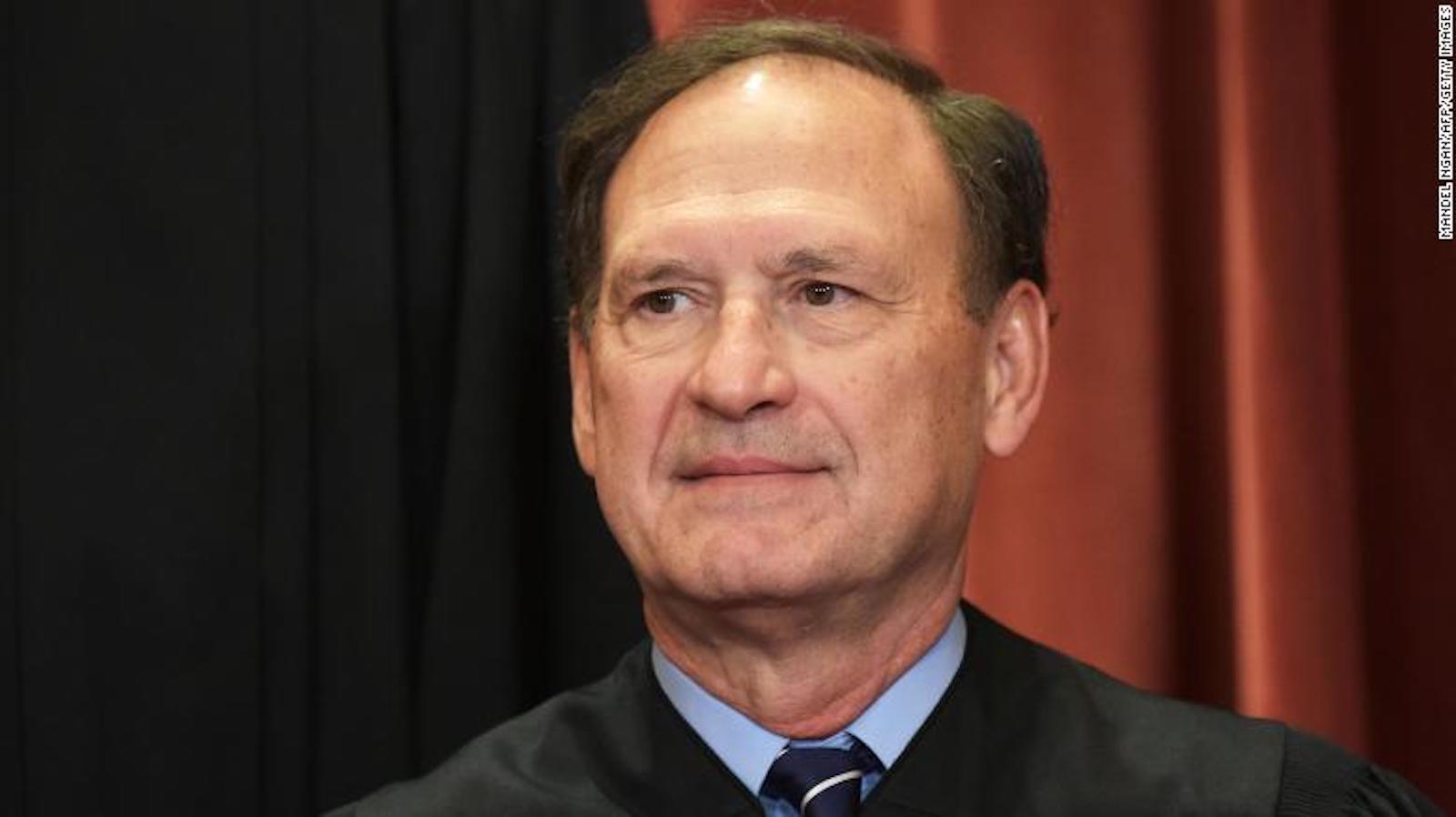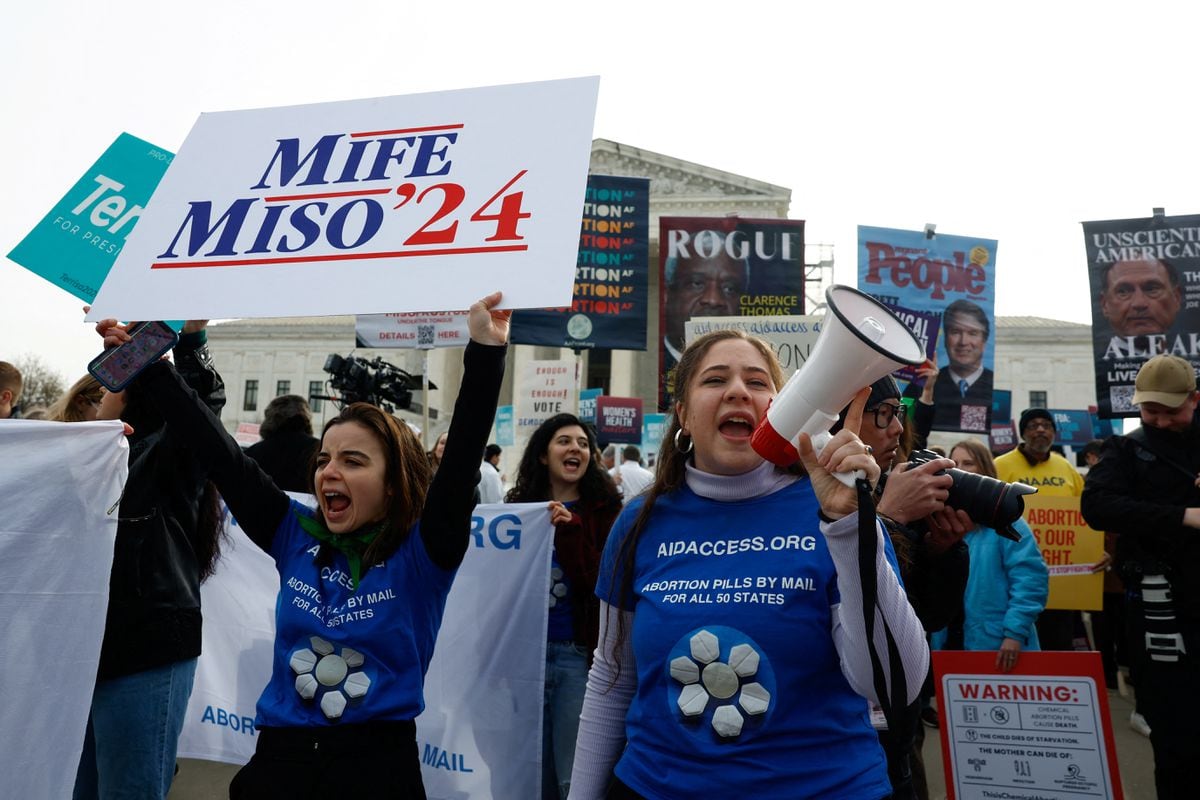Protests for and against abortion in Washington 1:22
(CNN) --
Take a look at the life of US Supreme Court Justice Samuel Alito.
Personal information
Date of birth:
April 1, 1950.
Place of birth:
Trenton, New Jersey.
Birth name:
Samuel Anthony Alito Jr.
Father:
Samuel Alito Profession: teacher.
advertising
Mother:
Rose (Fradusco) Alito.
Profession: teacher.
Marriage:
Martha-Ann (Bomgardner) Alito (From 1985-present)
Children:
Phillip and Laura.
Education:
Princeton University, 1972;
Yale University, J.D., 1975
What you need to know about the stunning revelation of a draft Supreme Court ruling that could spell the end of the nation's right to abortion
Other facts about Samuel Alito
He has been nicknamed "Scalito" because his views resemble those of the late conservative Supreme Court Justice Antonin Scalia.
He has brought 12 cases before the Supreme Court, the first in 1982.
Chronology
1976-1977 -
Legal assistant to Leonard I. Garth, Judge of the United States Court of Appeals for the Third Circuit.
1977-1981 -
Assistant US Attorney for the District of New Jersey.
1981-1985 -
Assistant US Attorney General.
1985-1987
- Deputy Assistant to the United States Attorney General.
1987-1990
- Appointed by President Ronald Reagan as United States Attorney for the District of New Jersey.
February 20, 1990
- Nominated by President George HW Bush to the United States Court of Appeals for the Third Circuit.
April 27, 1990
- Was confirmed unanimously by the Senate in a voice vote.
April 30, 1990-2006
- Appointed a judge of the United States Court of Appeals for the Third Circuit in Newark, New Jersey.
1991 -
She is the only dissenting voice in a Third Circuit ruling that struck down a Pennsylvania law that required women to notify their husbands if they planned to have an abortion.
1993
- Agrees with the majority that an Iranian woman seeking asylum could establish eligibility by demonstrating an aversion to her country's "gender-specific laws and repressive social norms," or by believing in feminism or being member of a feminist group.
1999 -
Writes opinion in a case saying a Christmas display on city property does not violate separation of church and state doctrines because it included a large plastic Santa Claus, as well as a menorah and banner depicting he saluted diversity.
2001
- Agrees with the majority that strikes down a public school district's anti-bullying policy, saying the policy—which included non-vulgar, non-school-sponsored speech—violated the First Amendment.
October 31, 2005
- President George W. Bush nominates Alito to replace Justice Sandra Day O'Connor on the Supreme Court.
January 31, 2006
- Alito is confirmed as an Associate Justice of the Supreme Court.
The United States Senate votes 58-42.
He is immediately sworn in by Chief Justice John Roberts.
February 1, 2006 -
Is sworn in as a Supreme Court justice for the second time in a White House ceremony.
May 29, 2007 -
In a 5-4 ruling, the court dismisses a wage discrimination lawsuit, and Alito writes for the majority.
The original lawsuit was filed by a worker, Lilly Ledbetter, against her employer, Goodyear Tire & Rubber Co. She claimed that she was being underpaid due to gender discrimination.
In his opinion, Alito writes that Ledbetter filed the claim after the federally mandated 180-day window of time, concluding that "the filing deadline shields employers from the burden of defending claims arising from decisions past jobs".
January 28, 2010 –
During a State of the Union address by President Barack Obama, Alito is seen uttering the words "not true" in response to the president's criticism of the court's 5-4 ruling in Citizens United vs.
the Federal Election Commission, which removed long-established legal limits on campaign spending by corporations and unions.
March 2, 2011 -
Alito is the lone dissenter in the free speech case involving the Westboro Baptist Church.
In an 8-1 decision, the court rules that the First Amendment allows the church to hold anti-gay protests, including at military funerals.
The Westboro Baptist Church had been sued by the family of a fallen Marine whose funeral was interrupted by protesters from the church.
In dissent from him, Alito writes: "Our deep national commitment to free and open debate is not a license for the vicious verbal attack that occurred in this case."
June 25, 2013 -
Writes the majority opinion in the case of Foster Couple vs.
Child, where the question is whether a single non-custodial parent can block an adoption using the federal Indian Child Welfare Act (ICWA).
The court ruled, 5-4, in favor of the adoptive parents, ruling that the ICWA did not apply when the father had never had physical or legal custody of the child.
June 30, 2014 -
Writes majority opinion in Burwell v.
Hobby Lobby, and the court ruled 5-4 that family-owned corporations may be exempt from a federal mandate requiring the inclusion of contraceptive coverage in employee health plans based on religious objections.
June 27, 2018 -
The court issues a 5-4 ruling striking down an Illinois law that requires non-union public sector workers to pay collective bargaining fines.
The opinion, written by Alito, says: "It is difficult to estimate how many billions of dollars have been taken from nonmembers and transferred to public sector unions in violation of the First Amendment. Such exactions cannot be allowed unconstitutional continue indefinitely.
February 1, 2019 -
Alito temporarily blocks Louisiana abortion law from going into effect, files order saying judges need more time to review documents filed in case against measure restricting access to clinics .
November 25, 2019 -
He writes the only disagreement in the court's denial of the petition in a National Review libel suit.
Climatologist Michael Mann sued the conservative magazine in 2012 after two columnists wrote about his work and the "Hockey Stick" curve chart illustrating rising average global temperatures.
Columnists accused him of "misconduct" and "manipulation" of data.
Alito wrote that the case raises First Amendment concerns "that go right to the heart of the constitutional guarantee of free speech and freedom of the press: the protection afforded to journalists and others who use harsh language to criticize the opposing defense of one of the most important public issues of the day.
May 2022 -
Judge Samuel Alito writes a draft to strike down the abortion law.
The text marks the end of the 49-year legal precedent that protects the right to abortion throughout the country.
The draft text, first reported by Politico, would radically change access to abortion by giving states the ability to decide how aggressively they can restrict access to the procedure.
Disclosure of the draft does not have an immediate effect on access to abortion.
If the apparent majority willing to overturn the landmark Roe v.
Wade is adamant, the precedent will not be overturned until the formal publication of the court's ruling, which is likely to come in June 2022.
united states news









